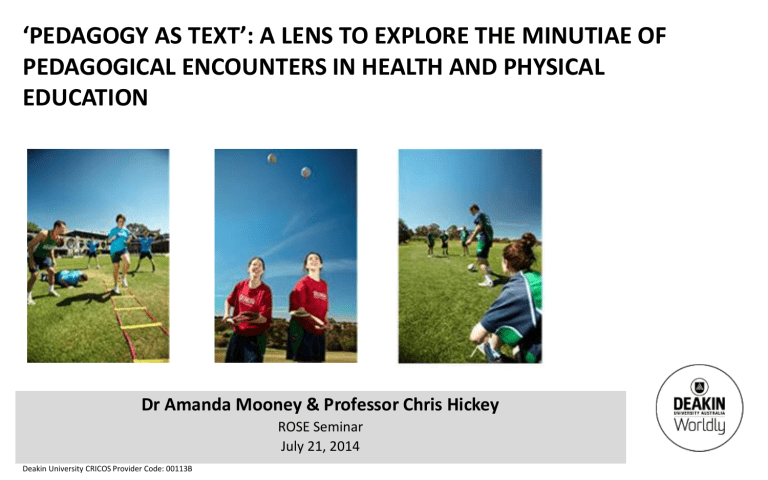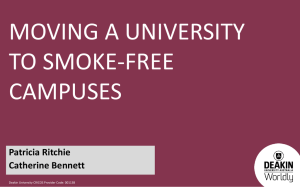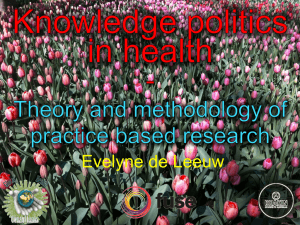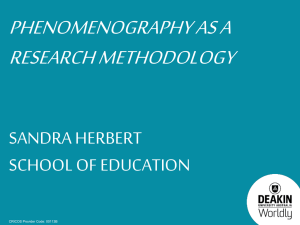A lens to explore the minutiae of pedagogical

‘PEDAGOGY AS TEXT’: A LENS TO EXPLORE THE MINUTIAE OF
PEDAGOGICAL ENCOUNTERS IN HEALTH AND PHYSICAL
EDUCATION
Dr Amanda Mooney & Professor Chris Hickey
ROSE Seminar
July 21, 2014
Deakin University CRICOS Provider Code: 00113B
EXAMINING PEDAGOGY
•
Pedagogy as concerned with the process of knowledge and truth production
•
How can we capture the intended and unintended learning that occurs through pedagogical encounters?
http://hubpages.com/hub/Two-Faces-or-a-Vase-
10-Simple-but-Wonderful-Optical-Illusions
Deakin University CRICOS Provider Code: 00113B
UNDERSTANDING PEDAGOGY
Curriculum Teaching
Learning
“how one teaches … is inseparable from what is being taught and, crucially how one learns”
(Lusted,
1986, p. 3)
Deakin University CRICOS Provider Code: 00113B
PE PEDAGOGY
Traditional pedagogies
Progressive pedagogies
Radical pedagogies
Tinning, 1997
Deakin University CRICOS Provider Code: 00113B
Demonstration,
Explanation, practice
EG. Direct instruct
ALT focused
Performance orientated pedagogies Sport Education
TGFU
Movement education
Participation orientated pedagogies
Critical pedagogies
Feminist pedagogies
Postmodern etc
PRODUCING KNOWLEDGE ABOUT PEDAGOGY
“Expert discussions about pedagogy have emerged, primarily, out of the intellectual positions associated with two different paradigms; one scientific (behavioristic) and the other social (critical) theory…”
(Kelly, Hickey & Tinning,
2000)
Biophysical ways of thinking about movement (anatomy, physiology)
Scientization of the discipline…
Technocratic rationalities….
ALT-PE (Academic Learning
Time – Physical Education)
Deakin University CRICOS Provider Code: 00113B
CONTEXT: BOYS’ PHYSICAL EDUCATION
What we think we know….
– Students’ experiences of physical education classes can be diverse and varied (Lee, 2010)
– Boys’ experiences of PE are far from homogenous (Kehler &
Atkinson, 2010)
– Examining pedagogical encounters can tell us much about the teacher, the student and the knowledge constructed during their interactions in specific contexts (socio-historical)
Deakin University CRICOS Provider Code: 00113B
PHYSICAL EDUCATION AS GENDERED….
Curriculum ?
Teaching
Learning
Message system through which ideas are constructed about, for example:
• Gender
• Identity
• The body
• Performance / competence / ability
• Peer relations
What theoretical tools are available to address these kinds of questions about pedagogy?
Deakin University CRICOS Provider Code: 00113B
PEDAGOGY AS TEXT….
•
Gore’s (1990) consideration of pedagogy
as text links the work of “Lusted and
Foucault…[to] argue that focusing on the process of teaching necessitates attention to the politics of those processes and to the broader political context in which they are situated…The way that pedagogy is received becomes a process of negotiation, a struggle over meaning” (p.
106)
Deakin University CRICOS Provider Code: 00113B http://www.handmaps.org/
This research….
Why Foucault?
Discourse Power Technologies of the self
• Provides a lens to explore how dominant discourses shape ‘truths’
• How power relationships shape social interactions in PE
• Encourage us to trouble the taken for granted…
Deakin University CRICOS Provider Code: 00113B
‘PEDAGOGY AS TEXT’: A METHODOLOGICAL LENS….
Physical
Education
Teacher
Education
•
Gore (1990, 1995, 1998) – empirical approach to examine practices of power in pedagogy
– Developed 8 coding categories – surveillance, normalisation, exclusion, classification, distribution, individualisation, totalisation, regulation
Girls’ gymnastic lesson…
•
Wright (2000) – focused on linguistic realisations of these categories through close analysis in a spoken context
Deakin University CRICOS Provider Code: 00113B
TECHNIQUES OF POWER
•
Surveillance – panopticon….perception of permanent visibility..
•
Normalisation –conforming to standard – defining normal
•
Exclusion – negative effect of normalisation, self and others…
•
Classification – categorising groups, individuals….dividing practices
•
Distribution – bodies in space, time
•
Individualisation – giving individual character to one person
•
Totalisation – giving collective character
•
Regulation – controlling behaviour – self and others
Deakin University CRICOS Provider Code: 00113B
GOLF AT THE DRIVING RANGE – ‘IT DEFINITELY
WASN’T A ‘HOLE IN ONE’ LESSON
Gore argues that if we move beyond the preferred reading of the text it is possible to “point to a range of possible readings which can be characterized as extending from acceptance to opposition. One’s reading of the scenario will depend on one’s subjectivity/subjectivities” (1990, p. 109).
Deakin University CRICOS Provider Code: 00113B
THE MESSINESS OF PEDAGOGICAL ENCOUNTERS…..
Rachel comments, “the plan was to have some sort of swinging practice initially without using golf balls.
I think the number one focus for me was definitely safety…During Rachel’s instructions on how to grip the club and adopt the correct stance, three students picked up their cones and started shouting into them like a megaphone to the person next to them whilst four others who were waiting in line behind their partner decided to sit or sprawl about on the group. Whilst watching the footage, Rachel comments, “These are all the things that I have to encounter and sometimes I think am I the only person who has to deal with this sort of behavior?....
• Taken-for-granted truths about ‘good’ pedagogy can result in less than desirable student and teacher experiences
• The micro-political context is replete with dominant discoursepower relations that shape experiences of pedagogy
Deakin University CRICOS Provider Code: 00113B
In asking Rachel if she would do anything differently in her next golf lesson, she laughs and comments, “Have the golf pro take it…I think I had some good ideas with the formation of the cones to give them a particular spot to practice in , but maybe I needed some more demonstrations or perhaps could have had a student doing the demos, maybe I could have used the space a bit better, had them in lines instead of a semi-circle…when they are kicking things around and not standing still it annoys me, how else can you interpret that …I asked Rachel what type of information she was trying to convey during this part of the lesson, she states, “well they need some technical knowledge, I mean it is probably obvious to some of them but to many others who don’t know much about golf then I think they need to know…that’s the thing about teaching, you are constantly challenged to make sure you are catering for different learners….”
•
Disciplinary power….
Distribution of bodies in space as marked out behind the cones
• Power as bottom-up:
Student responses conveyed a degree of resistance to Rachel’s instructional phase, which, in turn, her approach.
regulated
Deakin University CRICOS Provider Code: 00113B
…Rachel indicates to the boys that they can move over to the driving range but they need to stay in their pairs and ensure they stand well back from the student practising.
She reiterates that once they have hit their ball they are to swap over for their partner to have a go and under no circumstances are they to go onto the range to pick up their ball until they are given instructions to do so. Despite this, after one hit, one boys runs directly after his ball and
Rachel blows her whistle and yells at this student to get back.
She runs her fingers through her hair clearly exasperated….the students wait for a minute and then go back to their practising and bantering between each other about the success, or otherwise, of each shot. Craig, a student who appeared to be struggling to make contact with the ball, commented in a follow up interview, “ Really it was a crap lesson, I didn’t really learn anything new, I knew
I couldn’t play golf before and now I know for sure , it is hard to concentrate when you have ten other boys changing that you’re going to miss it…
Deakin University CRICOS Provider Code: 00113B
Disciplinary power….
• Classification of student ability – by teacher and by students themselves
• Surveillance of student behaviour that attempts to regulate
• Normalisation of student interactions as just a boys’ PE class
Recognising that some members of the group had become quite unruly and were basically using this practice time as an opportunity to pick on the failings of other students like
Craig, Rachel stopped the class to reiterate some of the key technique points when driving the ball.
She commented on stance variations for the type of shot and the position of the elbows throughout the swing, reinforcing the importance of a hip-to-shoulder rotation through the swing. Matt comments, “We know all this
Miss, show us your swing…how far can you drive the ball…”
Disciplinary power….
• Regulative effects of power relations in response to her students’ gaze ( surveillance)
Deakin University CRICOS Provider Code: 00113B
IMPLICATIONS & CONCLUSIONS….
•
Lens to examine the micropolitical context, but can also reveal macro discourse-power relations that shape practice
“the workings of power in educational settings should never be taken lightly or over-simplified, given that educational institutions and their assorted sets of practices provide ideal environments for the interplay of multiple forms of power – cultural, social and structural – forms that in many case are irreducible to the others” (
Murphy, 2013, p. 8)
Deakin University CRICOS Provider Code: 00113B
REFERENCES
Gore, J. (1990). Pegagogy as text in physical education teacher education: beyond the preferred reading. In D. Kirk, & R. Tinning (Eds.),
Physical education, curriculum and culture: Critical issues in the contemporary crisis (pp. 79-108). London: Falmer Press.
Gore, J. (1995). On the continuity of power relations in pedagogy. International Studies in the Sociology of Education, 5(2), 165-188.
Gore, J. (1998). Disciplining bodies: On the continuity of power relations in pedagogy. In T. Popkewitz, & M. Brennan (Eds.), Foucault's
Challenge: Discourse, knowledge and power in education (pp. 231-251). New York: Teachers College Press.
Kehler, M., & Atkinson, M. (Eds.). (2010). Boys' bodies: Speaking the unspoken. New York, NY: Peter Lang Publishing, Inc.
Kelly, P., Hickey, C., & Tinning, R. (2000). Producing knowledge about physical education pedagogy: Problematizing the activities of expertise. Quest, 52(3), 284-296.
Lee, J. (2010). Students' evolving meanings and experiences with physical activity and sport. In M. O'Sullivan, & A. MacPhail (Eds.), Young
people's voices in physical education and youth sport (pp. 108-122). Milton Park, Abingdon: Routledge.
Lusted, D. (1986). Why pedagogy? Screen, 27(5), 2-14.
Murphy, M. (2013). Social theory and education research: An introduction. In M. Murphy (Ed.), Social theory and education research:
Understanding Foucault, Habermas, Bourdieu and Derrida (pp. 3-18). Milton Park, Abingdon, United Kingdom: Routledge.
Wright, J. (2000). Disciplining the body: Power, knowledege and subjectivity in a physical education lesson. In A. Lee, & C. Poynton (Eds.),
Culture and Text (pp. 152-168). Sydney, Australia: Allen and Unwin.
Deakin University CRICOS Provider Code: 00113B






